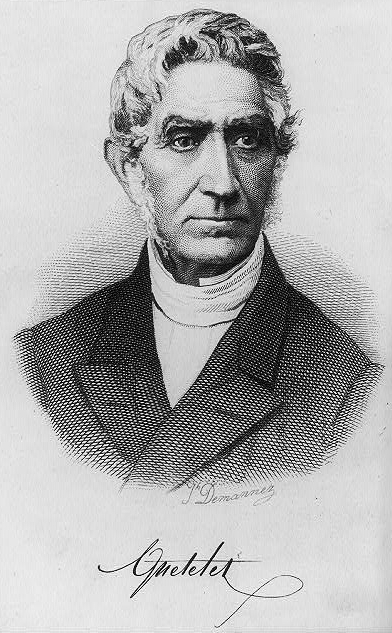Introductory
A Treatise on Man and the Development of His Faculties (1842)
Adolphe Quetelet: Citáty v angličtine
Introductory
A Treatise on Man and the Development of His Faculties (1842)
Preface of M. Quetelet
A Treatise on Man and the Development of His Faculties (1842)
Preface of M. Quetelet
A Treatise on Man and the Development of His Faculties (1842)
“I am less desirous to explain phenomena than to establish their existence.”
Preface of M. Quetelet
A Treatise on Man and the Development of His Faculties (1842)
Preface of M. Quetelet
A Treatise on Man and the Development of His Faculties (1842)
Preface of M. Quetelet
A Treatise on Man and the Development of His Faculties (1842)
Preface of M. Quetelet
A Treatise on Man and the Development of His Faculties (1842)
Preface of M. Quetelet
A Treatise on Man and the Development of His Faculties (1842)
Preface of M. Quetelet
A Treatise on Man and the Development of His Faculties (1842)
"Notice sur J.G. Garnier," Annuaire de l'acad. roy. de Brux. (1841) Vol. vii pp. 200-201 as quoted in Adolphe Quetelet as Statistician by Frank Hamilton Hankins
Astronomie élémentaire? (1834) as quoted by Theodore M. Porter, "From Quetelet to Maxwell: Social Statistics and the Origin of Statistical Physics" in The Natural Sciences and the Social Sciences: Some Critical and Historical Perspectives (2013) ed., I. Bernard Cohen
Preface of M. Quetelet
A Treatise on Man and the Development of His Faculties (1842)
Adolphe Quételet. 1981. Letters addressed to H.R.H. the Grand Duke of Saxe Coburg and Gotha, on the theory of probability. Arno Press, p. 134
Preface of M. Quetelet
A Treatise on Man and the Development of His Faculties (1842)
Preface of M. Quetelet
A Treatise on Man and the Development of His Faculties (1842)
Introductory
A Treatise on Man and the Development of His Faculties (1842)
Preface of M. Quetelet
A Treatise on Man and the Development of His Faculties (1842)
Kontext: From the examination of numbers, I believed myself justified in inferring, as a natural consequence, that, in given circumstances, and the influence of the same causes, we may reckon upon witnessing the repetition of the same effects, reproduction of the same crimes, and the same convictions. What has resulted from this exposition? Timorous persons have raised the cry of fatalism. If, however, some one said, "Man is born free; nothing force his free-will; he underlies the influence of external causes; cease to assimilate him to a machine, or to pretend to modify his actions. Therefore, ye legislators, repeal your laws; overturn your prisons; break your chains in pieces; your convictions penalties are of no avail; they are so many acts barbarous revenge. Ye philosophers and priests, speak no more of ameliorations, social or religious; you are materialists, because you assume to society like a piece of gross clay; you are fatalists, because you believe yourselves predestined to influence man in the exercise of his free-will, and to the course of his actions." If, I say, any one held such language to us, we should be disgusted with its excessive folly. And wherefore? Because we are thoroughly convinced that laws, education, and religion exercise a salutary influence on society, and that moral causes have their certain effects.
Introductory
A Treatise on Man and the Development of His Faculties (1842)
Introductory
A Treatise on Man and the Development of His Faculties (1842)
Preface of M. Quetelet
A Treatise on Man and the Development of His Faculties (1842)
Introductory
A Treatise on Man and the Development of His Faculties (1842)
